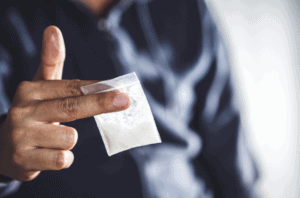Many addictive substances are dangerous when used in isolation; however, some drug combinations increase the likelihood of developing serious, potentially life-threatening side effects, or overdose. Combining alcohol and cocaine is one such event.
The co-occuring ingestion of these substances poses significant health risks and is more harmful than using either of the drugs individually. To fully understand the dangers of blending these two substances, it is important to examine their distinctions, as their particular side effects each contribute to damage sustained.

Alcohol
Alcohol is a central nervous system depressant (CNS) This substance is ever-present within society and is the most abused substance in the world. As a CNS, alcohol impacts brain function, motor skills, and cognitive functioning. When used in excess, alcohol is likely to act as a poison to the physical body, causing the user to vomit or become unconscious. According to the Centers for Disease Control and Prevention, approximately 95,000 deaths each year are attributed to alcohol consumption. These fatalities include alcohol-induced traffic accidents, liver failure, and alcohol poisoning, among others.
Cocaine
Cocaine is an illegal stimulant derived from the coca plant. Commonly snorted, the drug induces feelings of euphoria, invincibility and generates excessive energy in the user. Cocaine affects the brain by increasing levels of dopamine, a neurotransmitter related to the pleasure and reward centers of the brain. Due to the flood of dopamine during use, cocaine is extremely addictive. Being a stimulant, prolonged use of the drug negatively impacts central nervous system functions and can cause stroke, cardiac arrhythmia, cardiac arrest, convulsions, and death.
Alcohol and Cocaine
There are many hazardous side effects of ingesting alcohol and cocaine simultaneously. These include heart palpitations, increased blood pressure, and impaired motor functioning. The most serious side effect of this combination occurs when the liver metabolizes the substances.
When metabolized, the liver produces cocaethylene, a psychoactive metabolite similar to cocaine but much longer-lasting. This metabolite enhances the user’s high and reinforces impairment caused by alcohol and cocaine in the system. Once cocaethylene begins circulating throughout the body, it builds up and begins negatively impacting major organs including the heart, brain, and liver. As this metabolite increases, toxic levels begin building up in the liver leading to dangerous toxicity. Because of this, cocaethylene is commonly linked to fatal overdoses.
According to the Journal of Addictive Diseases, cocaethylene has been associated with seizures, liver damage, and compromised functioning of the immune system. It also carries an 18- to 25-fold increase over cocaine alone in risk for immediate death. Once cocaethylene has reached toxic levels, negative reactions may be experienced, causing irreversible, life-threatening damage. These side effects include:
- Heart attack
- Seizure
- Liver damage
- Stroke
- Aneurysm
- Brain hemorrhage

Asheville Recovery Center Can Help
Alcohol and cocaine are both highly addictive and life-threatening when abused on their own and, especially, when combined. It is extremely important to seek help immediately if you or a loved one is struggling with any substance addiction. At Asheville Recovery Center, treatment specialists have developed a unique, hybrid model of treatment which combines a traditional 12-step program with holistic rehabilitation. A multitude of services, programs, and therapies are offered, including the Partial Hospitalization Program, Residential-style treatment, outpatient rehabilitation, and more.
The founders of Asheville Recovery Center, as well as many of our addiction therapists, have struggled with addiction and now enjoy life in recovery. They understand the struggles of addiction and how difficult it is to overcome alone. If you feel that you or a loved one is struggling with substance abuse, our specialists are on standby and ready to help. Call (828)383-0784 and speak with an addiction expert today.






